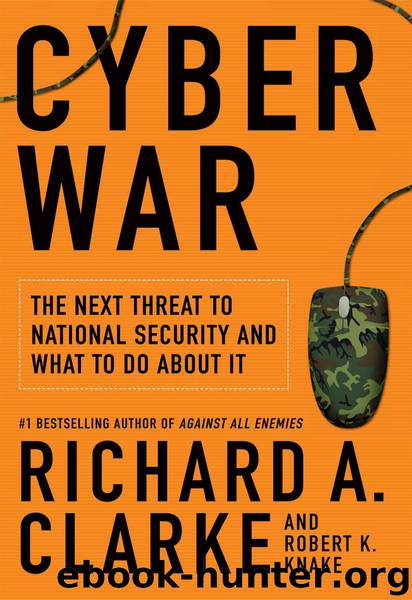Cyber War: The Next Threat to National Security and What to Do About It by Richard A. Clarke & Robert K. Knake

Author:Richard A. Clarke & Robert K. Knake [Clarke, Richard A. & Knake, Robert K.]
Language: eng
Format: epub
Tags: Non-Fiction
ISBN: 9780061992391
Google: KOtxx_eWQCwC
Publisher: HarperCollins
Published: 2010-04-20T07:00:00+00:00
6. NO, I THOUGHT YOU WERE DOING IT
Change, however, is coming. Like the United States, more and more nations are establishing offensive cyber war organizations. U.S. Cyber Command also has a defensive mission, to defend the Department of Defense. Who defends the rest?
As it stands now, the Department of Homeland Security defends the non-DoD part of the federal government. The rest of us are on our own. There is no federal agency that has the mission to defend the banking system, the transportation networks, or the power grid from cyber attack. Cyber Command and DHS think that by defending their government customers they may coincidentally help the private sector a little, maybe. The government thinks it is the responsibility of individual corporations to defend themselves from cyber war. Government officials will tell you that the private sector wants it that way, wants to keep the government out of their systems. After all, they are right that no one in government would know how to run a big bank’s networks, or a railroad’s, or a power grid’s.
When you talk to CEOs and the other C-level types in big companies (chief operating officers, chief security officers, chief information officers, chief information security officers), they all say pretty much the same things: we will spend enough on computer security to protect against the day-to-day threat of cyber crime. We cannot, they say, be expected to know how to, or spend the money to, defend against a nation-state attack in a cyber war. Then they usually add words to the effect of, “Defending against other nations’ militaries is the government’s job, it’s what we pay taxes for.”
At the beginning of the era of strategic nuclear war capability, the U.S. deployed thousands of air defense fighter aircraft and ground-based missiles to defend the population and the industrial base, not just to protect military facilities. Every major city was ringed with Nike missile bases to shoot down Soviet bombers. At the beginning of the age of cyber war, the U.S. government is telling the population and industry to defend themselves. As one friend of mine asked, “Can you imagine if in 1958 the Pentagon told U.S. Steel and General Motors to go buy their own Nike missiles to protect themselves? That’s in effect what the Obama Administration is saying to industry today.”
On this fundamental issue of whose job it is to defend America’s infrastructure in a cyber war, the government and industry are talking past each other. As a result, no one is defending the likely targets in a cyber war, at least not in the U.S. In other countries, some of whom might be cyber war adversaries someday, the defense part of cyber war might be doing a little better than it is here.
Download
This site does not store any files on its server. We only index and link to content provided by other sites. Please contact the content providers to delete copyright contents if any and email us, we'll remove relevant links or contents immediately.
| Blogging & Blogs | eBay |
| E-Commerce | Hacking |
| Online Searching | Podcasts & Webcasts |
| Search Engine Optimization | Social Media |
| Social Media for Business | Web Browsers |
| Web Marketing |
Secrets of the JavaScript Ninja by John Resig Bear Bibeault(21366)
Kotlin in Action by Dmitry Jemerov(20425)
Grails in Action by Glen Smith Peter Ledbrook(17371)
Sass and Compass in Action by Wynn Netherland Nathan Weizenbaum Chris Eppstein Brandon Mathis(14803)
WordPress Plugin Development Cookbook by Yannick Lefebvre(4418)
Ember.js in Action by Joachim Haagen Skeie(4310)
Mastering Azure Security by Mustafa Toroman and Tom Janetscheck(3543)
Learning React: Functional Web Development with React and Redux by Banks Alex & Porcello Eve(3183)
The Innovators: How a Group of Hackers, Geniuses, and Geeks Created the Digital Revolution by Walter Isaacson(3166)
A Blueprint for Production-Ready Web Applications: Leverage industry best practices to create complete web apps with Python, TypeScript, and AWS by Dr. Philip Jones(3131)
Mastering Bitcoin: Programming the Open Blockchain by Andreas M. Antonopoulos(3036)
The Art Of Deception by Kevin Mitnick(2797)
Drugs Unlimited by Mike Power(2591)
Hands-On Cybersecurity with Blockchain by Rajneesh Gupta(2463)
Kali Linux - An Ethical Hacker's Cookbook: End-to-end penetration testing solutions by Sharma Himanshu(2390)
Writing for the Web: Creating Compelling Web Content Using Words, Pictures and Sound (Eva Spring's Library) by Lynda Felder(2349)
SEO 2018: Learn search engine optimization with smart internet marketing strategies by Adam Clarke(2262)
JavaScript by Example by S Dani Akash(2218)
DarkMarket by Misha Glenny(2207)
